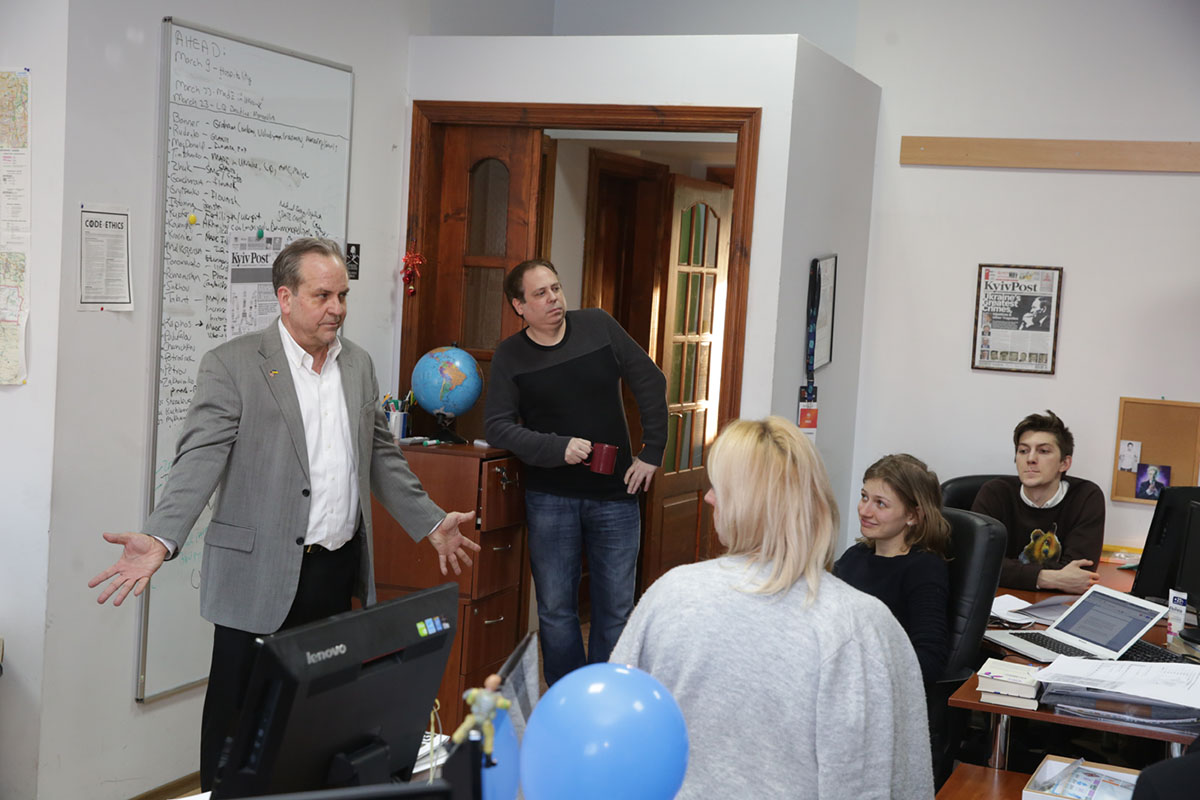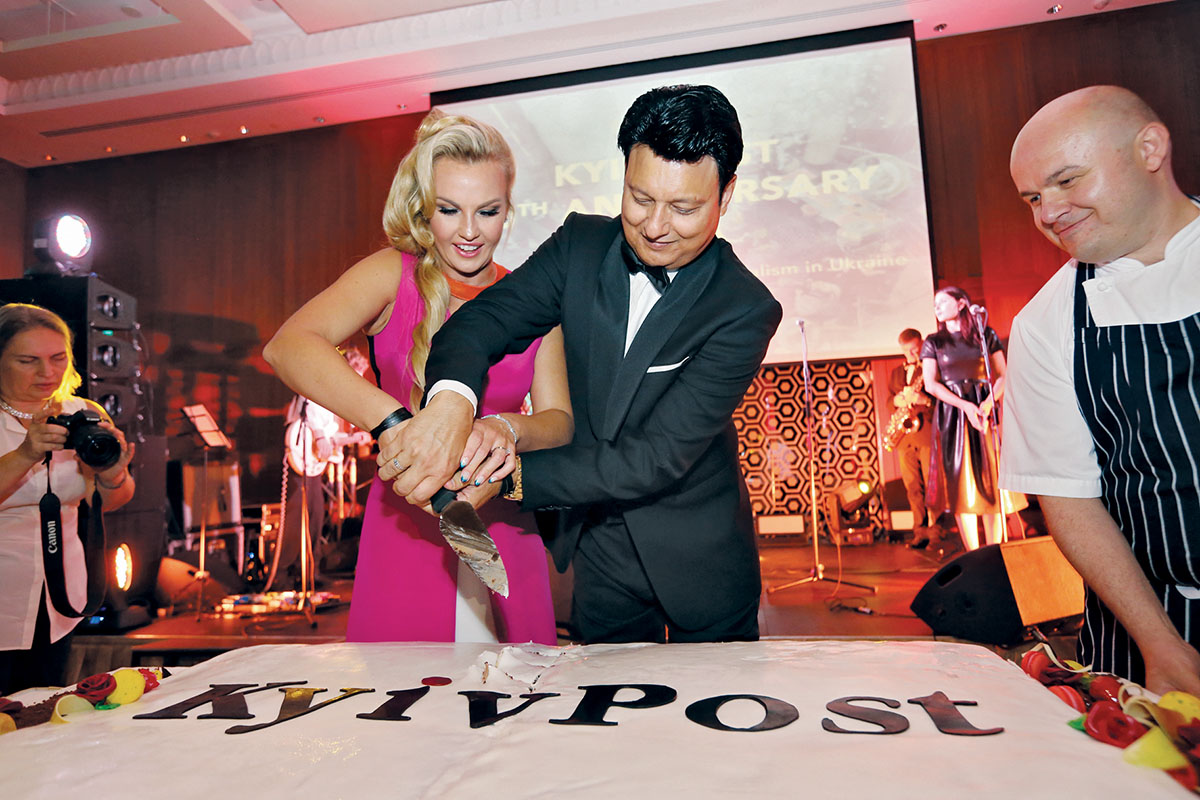Mohammad Zahoor, only the second owner in the Kyiv Post’s nearly 23-year history, has sold the newspaper to Adnan Kivan, an Odesa millionaire businessman and native of Syria.
The sale took place on March 21 for “much higher than” $3.5 million.
In a brief telephone conversation on March 22, Kivan told Kyiv Post chief editor Brian Bonner that he supports independent journalism, democracy and strong stands against corruption. He said that he is open to retaining the current staff, but wanted to discuss his plans for the Kyiv Post in detail with Bonner in the coming week.
Zahoor, a native of Pakistan and United Kingdom citizen who made much of his fortune in the steel industry, bought the Kyiv Post on July 28, 2009, from its original owner, American Jed Sunden, for $1.1 million. Sunden started publishing the Kyiv Post on Oct. 18, 1995.
Zahoor said that Kivan approached him after hearing that the newspaper was for sale. Zahoor also had meetings with other potential buyers but has repeatedly stated that he would not sell to anybody bent on destroying the newspaper or its history of editorial independence.
He said that Kivan assured him that he values journalistic independence, but reserves the right to hire his own team.
After meeting him once about two weeks ago, Zahoor said he is convinced that Kivan is not “fronting” for any politician in Ukraine and intends to invest into the Kyiv Post. Zahoor said that Kivan has had legal run-ins with governmental authorities and understands the value of a watchdog newspaper.
“He thinks about the Kyiv Post as a No. 1 brand,” Zahoor said.
No change in strategy
In the discussion with Kivan, Zahoor said he told him that “we want this thing to be run as an independent newspaper. As far as I know, it will still keep working as an independent newspaper. He told that he doesn’t want to change anything in the strategy of the Kyiv Post.”
As for coverage, Zahoor said Kivan wants “to highlight the Syrian problem in Ukraine, which is not very much highlighted.” Otherwise, he said, Kivan is “non-partisan and has no relationship with” any politicians although Zahoor said he detected “a soft corner for Yulia Tymoshenko.”
Zahoor is impressed with Kivan’s business acumen.
“He is one of the biggest businessmen in Odesa, if not the biggest businessman. He owns a construction company there. He’s a very reputable businessman there; he owns a TV station there as well. He wants to grow his media business, unlike I did. I owned the Kyiv Post purely as a community service, not as a core business. To him, the Kyiv Post will be part of his expansion into media. He’s building a TV studio here as well in Kyiv.”
Zahoor estimates he’s spent “at least $5 million” on the Kyiv Post, which was in dire financial condition when Sunden sold it to him in 2009, during a global financial crisis.

Kyiv Post chief editor Brian Bonner (L) addresses his team on March 22, a day after the newspaper was sold to the Odesa businessman Adnan Kivan. (Kostyantyn Chernichkin)
Zahoor also had discussions with Tomas Fiala, CEO of Dragon Capital and owner of Novoye Vremya magazine and radio station. Fiala told the Kyiv Post that Zahoor’s asking price was too high for him.
Zahoor has fended off offers from buyers fronting for politicians who wanted to buy the Kyiv Post to destroy it or end its editorial independence. The reason why the Kyiv Post is such a target is that its journalists have frequently written critical opinions and conducted tough investigations of oligarchs and politicians.
Besides the financial investments, the publisher has defended the newspaper’s independence many times.
In 2011, President Viktor Yanukovych’s agriculture minister, Mykola Prysazhnyuk, tried to force Zahoor to stop publication of an interview that implicated the now-fugitive Prysazhnyuk in corruption schemes involving the grain trade. That same year, billionaire oligarch Dmytro Firtash — now in exile fighting U.S. corruption charges — sued the Kyiv Post in the U.K for libel after a 2010 story about corruption in Ukraine’s natural gas sector. A London court dismissed the claim.
Additionally, Zahoor said, Firtash and Yanukovych front man Sergei Kurchenko also attempted to buy the Kyiv Post, but he refused. More recently, Zahoor said that people he suspected as fronts for President Petro Poroshenko approached him about buying the newspaper, but he told them he wasn’t interested.
‘Like a father’
Zahoor said he has always looked on the Kyiv Post “like a father” looks upon his child. “I feel like you raise your daughter and she gets married and she moves to somebody else’s house. I always cared about the Kyiv Post like a father. I didn’t want it to go somewhere. My daughter should go to a respectable and reputable family. As far as I think and as far as my investigation goes, this is how it is.”
Zahoor, however, admitted that he doesn’t know what the new owner will do.

Kyiv Post publisher Mohammad Zahoor and his wife, Ukrainian singer-actress Kamaliya, cut the cake at the Kyiv Post 20th Anniversary Gala on Sept. 19, 2015. (Volodymyr Petrov)
No guarantees
“I cannot guarantee how he is going to run it. I hope he runs it much better and more hands-on, unlike myself. It could even be better. It all depends on whether they are capable of running it, how far they will go to support their editorial team. I went miles for that. I told him that the team I have got is a very good team. As an owner, as a future owner, he told me that he should have the right to pick the team. He would listen to the team, talk to the team, but he has the right to pick the team.”
New owner
Kivan is a Ukrainian businessman of Syrian origin. His businesses are focused in Ukraine’s southern Black Sea port city of Odesa. He is best known for his development projects.
Kivan’s net worth was calculated as $95 million by Ukrainian Forbes magazine in 2012. In 2016, his construction company Kadorr Group was worth $1 billion, according to Odesa media. The company built around 30 residential and commercial buildings in prime locations, including on the shoreline.
Kivan had troubles with the law in 2017.
The Security Service of Ukraine (SBU) accused Kivan of financing of the Russian-backed separatists in the Donbas. Kivan called the accusations “nonsense.”
At the same time, several members of parliament filed complaints claiming that the city authorities allocated land for Kivan’s development projects unfairly.
In October, Odesa media reported that Kivan fled Ukraine.
In Odesa, Kivan owns a local TV station, Channel 7, a major outlet. He has also an associated Ukrainian Information Service website (usionline.com), according to the Institute Mass Information.
Kivan also financed the construction of Arab Cultural Center in Odesa that opened in June 2001 as “a gift to Odesa citizens.”
7th Channel
Kivan’s Channel 7 is highly critical of city authorities and has no specific editorial policy on national authorities, Vitaly Ustymenko, head of the AutoMaidan civil society group’s Odesa branch, told the Kyiv Post. Ustymenko accused Kivan of launching illegal construction projects jointly with Odesa Mayor Gennady Trukhanov before 2015, when Trukhanov and Kivan fell out.
Kyiv Post’s reputation
Bonner, the Kyiv Post chief editor who has held the post since 2008 and who also served as chief editor in 1999, said that he hopes the new owner will maintain editorial independence.
“Knowing the community the way I know it — the readers, the subscribers, the advertisers — I don’t think they will support or read a newspaper whose journalists are censored or who are told by the owner what to write and what not to write. The reason that the Kyiv Post has been successful for so long is that we have earned extraordinary trust for our honest, fair, independent, hard-hitting reporting and our fearless opinions. We make our mistakes and have our biases, but they are honest mistakes and honest biases which we try very hard to correct.”
Neither Bonner nor the staff had advance warning about the Kivan deal. Bonner learned of the sale in a telephone conversation with Zahoor about 6:30 p. m. on March 21.
Financial situation
The Kyiv Post is an exception on the Ukrainian media scene. It is not owned by an oligarch and earns most of its revenue — through advertising, subscriptions and events — although Zahoor has subsidized operations substantially. Kyiv Post journalists also started a non-profit Media Development Foundation in 2013 to raise money for investigative journalism, exchanges and training programs.
